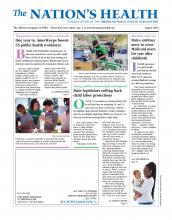
For more information about preventing infections for yourself and others, visit www.cdc.gov
Photo RgStudio, courtesy iStockphoto
Are you the kind of person who hardly ever gets sick? Or do you sometimes catch a bug, but bounce back quickly?
If so, you’re fortunate, because it means your immune system is working well. The immune system is your body’s defense against viruses, bacteria and other germs that can cause an infection.
But there are millions of people who are “immunocompromised,” which means their immune system doesn’t work as well as it should.
People with weakened immune systems are more likely to get serious infections and have a harder time fighting them off, says William Schaffner, MD, an infectious disease professor at Vanderbilt University School of Medicine.
A weakened immune system is most often the result of a disease or medical treatment that leaves someone less able to fight off an infection. Some long-term diseases, such as HIV and diabetes, can damage the immune system. And so can cancer treatments. Some medications used for asthma, allergies and rheumatoid arthritis can also suppress the immune system.
Two other common groups often have weakened immune systems: pregnant people and older adults. In fact, the older you are, the weaker your immune system may be.
With so many reasons to have a weakened immune system, it’s likely that you’re around people who have one without even knowing it.
Be extra thoughtful every day
Perhaps your mother is receiving chemotherapy. Maybe your brother recently had a kidney transplant. Or you have a friend who takes drugs for her rheumatoid arthritis.
If you spend time with someone who has a weakened immune system, it’s important to be thoughtful and protect them from getting sick.
“Every one of us who has close association with those people ought to be as careful and as protective as possible,” says Schaffner. “We want to put a cocoon of protection around them.”
His tips to keep others safe include:
Vax up. Getting vaccinated is the most effective way to prevent infectious diseases, no matter how strong your immune system is. It protects you from getting sick and also reduces the chances you’ll infect others.
Wash up: Washing your hands is one of the most effective ways to prevent spreading infections to friends and loved ones who are immunocompromised.
“We have a rule in our house that as soon as you come in from out-of-doors, you hang up your jacket or coat and go directly to a sink and wash your hands,” he says.
Mask up: Monitoring the news in your community can prepare you for an outbreak of flu or COVID-19. If an outbreak occurs, open that drawer and grab a mask, especially if you’re caring for a friend or loved one who has a weakened immune system.
“Think about wearing that mask when you are out and about, particularly if you are going to be indoors where there are a lot of people,” Schaffner says. “And just be a little more socially distant so you can prevent bringing something into your home that might infect the person you are trying to protect.”
Another tip is to be careful with foods you serve. Some people who have weakened immune systems have a long list of food they should avoid — including sprouts, unpasteurized juice or dairy, deli meats and raw eggs. So before you whip up your favorite dish to share at that group dinner, check if the ingredients are safe for all the guests.
Put the brakes on those baby hugs
It’s a natural instinct to want to hold a newborn baby. They’re soft and little and smell so darned good!
But in the first weeks and months after they’re born, babies are especially vulnerable to infections. That’s because their immune systems aren’t fully functional.
Babies are at especially high risk of infection and serious problems from pertussis, also known as whooping cough. The reason is that they can’t be vaccinated against the disease until they are 2 months old. So make sure everyone who comes in close contact is up on their pertussis vaccinations — and on their other vaccinations as well.
If you or someone else is coughing or have the sniffles, let others hug that baby instead.
And one last tip: Always wash your hands before holding a baby. That way the only thing you will pass along with your touch is love.
- Copyright The Nation’s Health, American Public Health Association









